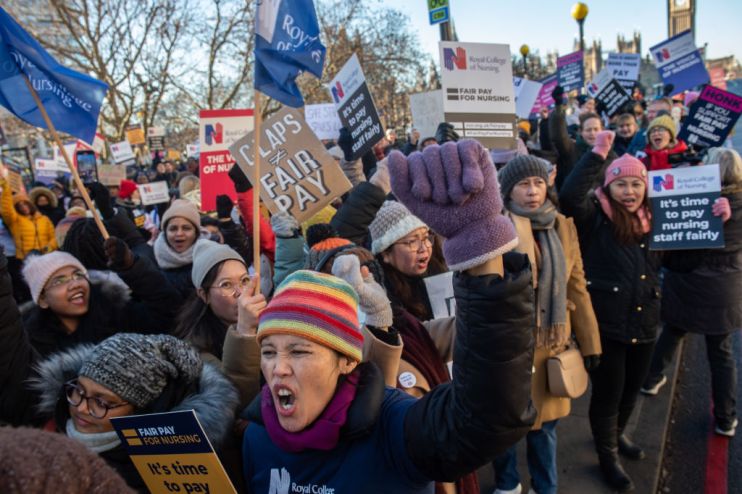Number 10: Rishi Sunak ‘deeply regrets’ Christmas strikes

Rishi Sunak “deeply regrets” the strikes disrupting the Christmas period but will not bend on public sector pay demands, Number 10 has said.
Sunak’s official spokesman today said it is “still in the gift of the unions to step back and reconsider the approach” as Britain suffers from a series of December strikes.
Up to 10,000 ambulance staff will go on strike on 21 December and 28 December, while airports are also set to come to a standstill as Border Force staff walk off the job.
They follow rail workers who walked off the job last week, with the UK’s transport networks set for serious disruptions as more days are lost to strikes over the next few weeks.
Thousands of nurses also began industrial action last week, after asking for a 19 per cent pay rise.
Health secretary Steve Barclay today said the government would not budge on pay demands by the NHS, after the UK’s independent pay review body recommended a 4.5 per cent pay rise for nurses.
“You’ll know from the health secretary he wants to keep talking to the unions,” Sunak’s spokesman said.
“We’re open to further talks if they’re willing to have them. We believe we have taken a fair and reasonable approach throughout.
“I think the Prime Minister deeply regrets the strike actions we’re seeing from a number of unions. We want them to engage with talks and help us find a resolution. Obviously we are putting some mitigations in place but we are honest that the public will feel some disruption, whether that’s with the health system or with transport.”
Business groups have said today that last week’s rail strikes crippled trade during what is supposed to be the busiest time of the year for retail and hospitality businesses.
The Night Time Industries Association (NTIA) said feedback from its members across the UK suggested that action by rail workers had had a “deeper impact than expected.”
Around 1,200 members of the military and 1,000 civil servants will be sent in by the government to cover striking ambulance drivers and Border Force staff.
The government is also putting together strike busting legislation that will try to minimise the disruption of striking workers.
Christina McAnea, boss of the UK’s largest union Unison, said that government ministers had been “completely intransigent” in negotiations over NHS strikes.
“We have been calling on them for weeks and weeks to sit down and have a proper discussion about how we try and resolve this dispute, and they adamantly refuse to do that,” she told the BBC.
“They will not talk to us about the elephant in the room that is pay.”
Striking workers are calling for pay rises that match or exceed the UK’s near 11 per cent annual inflation rate.
The government has argued that it will not give pay rises above what was recommended by the public sector pay body.